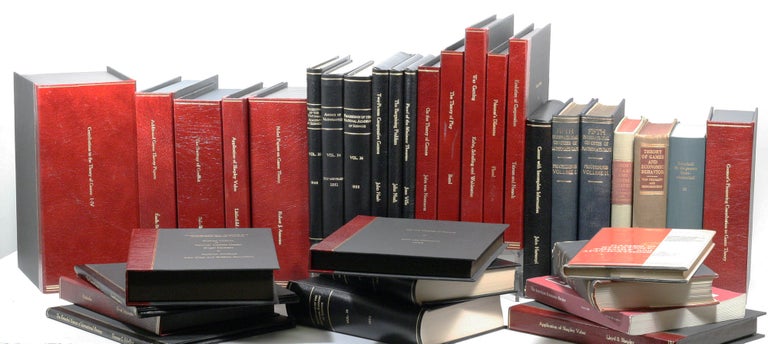Fighting Chances: The History of Game Theory from Zermelo to Thaler
UNPARALLELED COLLECTION CHARTING THE DEVELOPMENT OF GAME THEORY ACROSS THE TWENTIETH-CENTURY.
Click on the PDF to view the complete list of the collection's contents..
Fighting Chances: The History of Game Theory from Zermelo to Thaler is an extensive collection of works documenting the history of game theory—including its mathematical development as well as its many important real-world applications.
Game theory studies how decisions are made through mathematical modelling, and is found in everyday life across all industries and disciplines. It uses various forms of modelling to find the optimal strategy in competitive situations of uncertainty and incomplete knowledge—in effect, how to minimize questions of chance and risk in our decision-making processes. Game theory offers insights into a diverse range of fields, and can helped to determine the effects of political coalitions, business conglomerates, product pricing, voter distribution, jury selection, animal behaviour and much more.
The collection begins with the earliest traces of modern game theory, from Antoine Augustin Cournot’s work on economic analysis and the first definitive theorem of game theory, Ernst Zermelo's 1913 paper on the outcomes of chess, to the much-celebrated work of the world's current leading mathematicians and economists, concluding with cutting-edge research from Nobel laureates Robert Aumann and Richard Thaler in 2008.
Spanning more than a century, the collection preserves the major developments in the history of what is now the vastly influential field of game theory. Mostly comprised of primary material from the middle sixty years of the twentieth-century, the collection witnesses the early stages of game theory’s development from the seeds planted by Cournot and Zermelo to the internationally celebrated work of Nash, Shapley, Thaler and more. The research represented by this collection—almost always in the first print appearances—forms a corpus that has resulted in at least ten Nobel laureates in Economic Sciences: Leonid Kantonovich (1975), John Harsankyi (1994), John Forbes Nash (1994), Reinhard Selten (1994), William Vickrey (1996), Robert Aumann (2005), Thomas Schelling (2005), Roger Myerson (2007), Lloyd Shapley (2013), Richard Thaler (2017).
Fighting Chances offers the unique opportunity to acquire a museum-quality, exhibition-ready archive of game theory’s modern origins. Having taken years to trace individual items and compile a comprehensive record of many pivotal ideas’ inceptions over time, the present collection is a carefully curated selection of trailblazing documents that have changed the way major decisions are made across the world.
The accompanying PDF showcases some of the highlights from the collection to give a sense of its impressive insights into the developments of game theory, with pieces ranging from Zermelo in 1913 to Richard Thaler in 2008. A complete list of the collection can be found below as well as in the PDF.
To learn more about the contents of the collection, please see the PDF description of Fighting Chances: The History of Game Theory from Zermelo to Thaler.
Price: $90,000 .


